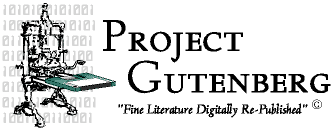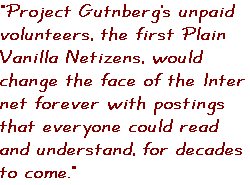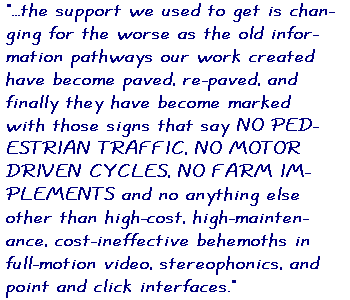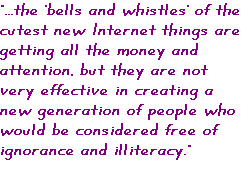
PROJECT GUTENBERG
The Project:
 Project Gutenberg began in 1971, in the early
and nebulous days of the Internet, when navigation and information retrieval was esoteric at best.
During this time, the Gutenberg team had an onerous goal: to convert the print texts of great
works of literature,
philosophy, and other wisdoms of humanity to electronic format. To this end, the Gutenberg team
established many of the navigation and file transfer protocols which characterize the Internet
today. As of 2 Jan 97, the project has released 768 books in digital format. The dreams and hopes
that Project Gutenberg founders had envisioned for the Internet have already become a reality,
and the
collection continues to grow, in spite of increasingly difficult constraints.
Project Gutenberg began in 1971, in the early
and nebulous days of the Internet, when navigation and information retrieval was esoteric at best.
During this time, the Gutenberg team had an onerous goal: to convert the print texts of great
works of literature,
philosophy, and other wisdoms of humanity to electronic format. To this end, the Gutenberg team
established many of the navigation and file transfer protocols which characterize the Internet
today. As of 2 Jan 97, the project has released 768 books in digital format. The dreams and hopes
that Project Gutenberg founders had envisioned for the Internet have already become a reality,
and the
collection continues to grow, in spite of increasingly difficult constraints.
What's It All About?
Project Gutenberg has gone through many stages of development, each stage usually resulting in
greater production. In 1996, readers saw the Gutenberg team release more books in that year than
their entire
previous 24 years of production. In 1997, the project hopes to double even that, to produce 64
electronic texts per month. The project has managed to survive with the gracious assistance of
Benedictine University, and formerly the University of Illinois (until they no longer saw fit to
grant access of the Gutenberg team to their server), but mostly by the exhaustive effort of an army
of volunteers (who enter, proofread, and edit all text) led by the project's director, Michael Hart.
A complete listing of the project's texts is available on their website. The website also gives information about forthcoming releases,
general information, information about purchasing the texts on CD-ROM, and other general news
of the team's progress.
What's Going On With It Now?
Despite two and a half decades of success, Project Gutenberg is seriously threatened. As noted,
the University of Illinois has taken away Project Gutenberg's access to the UI server, and
Benedictine University no longer is able to provide the project with financial support due to
budgetary constraints. The project's director, Michael Hart, has a long history of funding the
project from his own pocket, and now, because of the trend of funds being sent to more
technologically flashy projects, it appears as though he will have to continue to do so, or shut the
project down.


Michael Hart gives a
lengthy and detailed account of the Project Gutnberg's current woes, as well as an eloquent, if
modest, plea for
help. Among the help Gutenberg needs is legal counsel to help establish it as a non-profit
corporation, so that it may control its own finances, help entering and editing texts, and, of
course, help aquiring funding. Hart is both inexperienced and uncertain about grant writing, and
he especially asks for help in this regard. One of his primary concerns is that the project does not
have the flashy appeal of other, multimedia-intense projects, and thus Gutenberg is often
overlooked for funding. However, Gutenberg clearly is persuing a noble and commendable goal,
and reading text is something we should not allow to be supplanted by watching multimedia
presentations.
Those interested in helping Hart to keep Project Gutenberg going should contact him by e-mail, or subscribe to his volunteer listserv, which can
be found on the Project Gutenberg website.
Back
Click a link to see a description of the project:
| Project Gutenberg | Epiphany | Composition in Cyberspace | Crossroads
|
| Hyperfiction Narrative Workshop | Netoric | Jesters |
Click to Visit a Site:
| Project Gutenberg | Epiphany | Composition in
Cyberspace | Crossroads |
| Annenberg/CPB | Hyperfiction
Narrative Workshop |
Netoric | Jesters |
Direct comments to Scott Kapel

 Project Gutenberg began in 1971, in the early
and nebulous days of the Internet, when navigation and information retrieval was esoteric at best.
During this time, the Gutenberg team had an onerous goal: to convert the print texts of great
works of literature,
philosophy, and other wisdoms of humanity to electronic format. To this end, the Gutenberg team
established many of the navigation and file transfer protocols which characterize the Internet
today. As of 2 Jan 97, the project has released 768 books in digital format. The dreams and hopes
that Project Gutenberg founders had envisioned for the Internet have already become a reality,
and the
collection continues to grow, in spite of increasingly difficult constraints.
Project Gutenberg began in 1971, in the early
and nebulous days of the Internet, when navigation and information retrieval was esoteric at best.
During this time, the Gutenberg team had an onerous goal: to convert the print texts of great
works of literature,
philosophy, and other wisdoms of humanity to electronic format. To this end, the Gutenberg team
established many of the navigation and file transfer protocols which characterize the Internet
today. As of 2 Jan 97, the project has released 768 books in digital format. The dreams and hopes
that Project Gutenberg founders had envisioned for the Internet have already become a reality,
and the
collection continues to grow, in spite of increasingly difficult constraints.
